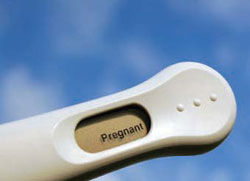Answers
- True. Drinking anything that contains alcohol can cause problems for your baby. Fetal Alcohol Syndrome (FAS), caused by drinking alcohol while pregnant, is a preventable cause of mental retardation and birth defects. There is NO safe amount of alcohol you can drink during pregnancy. It is advised that pregnant women avoid all types of alcohol throughout their entire pregnancy.
- False. It is true that during pregnancy your body needs more nutrients to provide your baby with what it needs to grow and be healthy. However, it is recommended that pregnant women only need to consume 300 extra calories per day. The extra nutrients needed during pregnancy are easily obtained through a healthy diet.
- True. More than 90% of women who have some type of disability go on to have babies without disabilities. With all pregnancies, make sure to visit your doctor regularly to discuss any questions or concerns.
- False. Exercising, or being physically active, throughout your pregnancy is not dangerous and doctors recommend it. If you exercised before you became pregnant, keep it up. If you didn't, you can still become active, but start slowly. Try walking at first, then build up to more. Talk to your doctor about which activities are good for you. Exercise during pregnancy helps you in many ways. It prevents a lot of extra weight gain, helps you sleep better, and helps you have a shorter, easier labor.
- True. All women who are able to get pregnant should get 400 micrograms of folic acid per day. Folic acid helps a baby's spine and brain form the right way, and can prevent some serious types of birth defects. Pregnant women need 600 micrograms of folic acid per day. Your doctor will prescribe a daily vitamin that has it, or you can buy folic acid pills. Keep eating foods high in folic acid like orange juice, other citrus fruits, leafy green vegetables, beans, peanuts, peas, and whole-grain products.
- True. When you are pregnant, your body is working harder than ever to fuel the growth of a precious new life. While you only need 300 extra calories each day, the kind of food you eat is very important because it affects how your baby can build and maintain cells, tissues, and organs. Healthy food choices like fruits, vegetables, whole-grain breads and pastas, non-fat or low-fat milk products, and low-fat protein sources, such as lean red meat, poultry without the skin, and beans will help your body do a good job of keeping both you and your baby healthy. You also should take a prenatal vitamin that contains folic acid every day. Talk to your doctor to ensure all of your diet meets the nutritional needs of pregnancy.
- True. During the first trimester of pregnancy, it is normal to gain only a small amount of weight, about one pound per month. According to the American College of Obstetricians and Gynecologists (ACOG): if you were underweight before becoming pregnant, you should gain between 28 and 40 pounds; if you were overweight, between 15 and 25 pounds. Recent research shows that women who gain more than the recommended amount during pregnancy and who fail to lose this weight within six months after giving birth are at much higher risk of being obese nearly 10 years later. Check with your doctor to find out how much weight gain during pregnancy is healthy for you.
- False. Even before you become pregnant, good health and nutrition are important to the well being of both mother and baby. But, there are some changes that need to be made to accommodate pregnancy. Pregnant women need more of certain vitamins, minerals, and proteins including calcium, folic acid, and iron. Rest and try not to over do it. While you are pregnant, you might not be able to do everything you did before you became pregnant. If you already have a healthy diet, you might only need to make a few adjustments to ensure you are receiving everything you need during pregnancy. Talk to your doctor to make sure you are getting everything you need for a healthy pregnancy.
- False. In some cases you can help control morning sickness. The types of food you eat, the amount you eat, and the time of day you eat can affect morning sickness. By avoiding greasy, fried, or spicy foods, you might be able to manage your nausea. You can also try to eat frequent small meals (six to eight per day instead of three large meals). Try eating starchy foods such as toast, saltines or Cheerios when you feel nauseous. Also make sure to rest and avoid stress when you are tired.
Source: The National Women's Health Information Center, U.S. Department of Health and Human Services
Winter 2008 Issue: Volume 3 Number 1 Page 24

